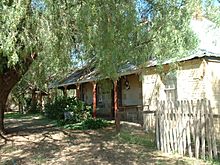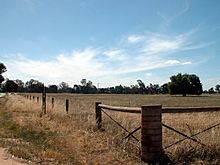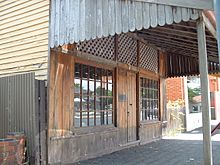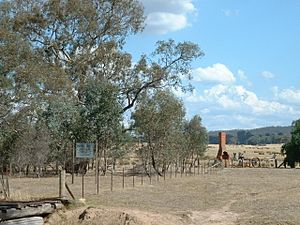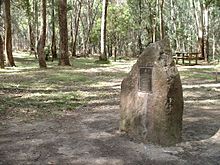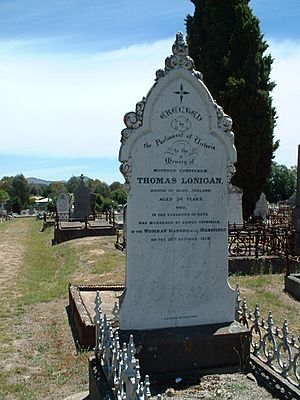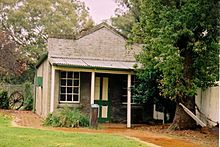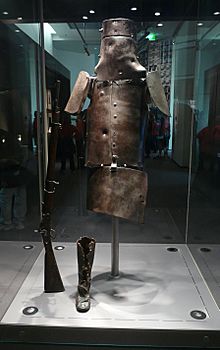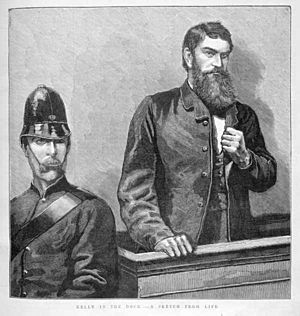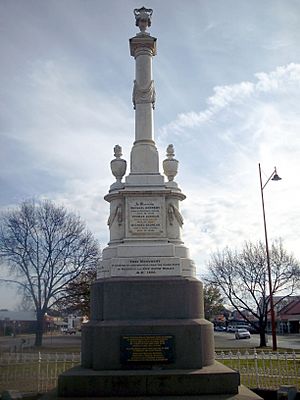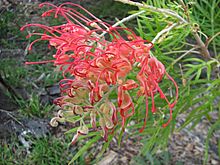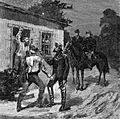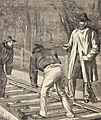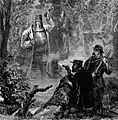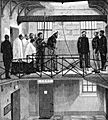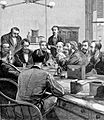Ned Kelly facts for kids
Quick facts for kids
Edward Kelly
|
|
|---|---|
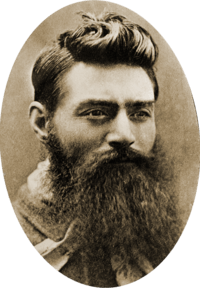
Ned Kelly in 1880
|
|
| Born | June 1855 |
| Died | 11 November 1880 Melbourne, Victoria, Australia
|
| Cause of death | Hanging |
| Nationality | Australian |
| Other names | Ned Kelly |
| Occupation | Bushranger |
| Known for | Gang member, murderer |
Edward "Ned" Kelly (June 1855–11 November 1880) is Australia's most famous bushranger. He is a legendary figure in Australian history, folklore, books, art and movies. Ned Kelly is remembered in the saying "... as game as Ned Kelly"; the word game in this case meaning brave.
While he was growing up, his family was often in trouble with the police. After fighting a policeman at his home in 1878, Kelly went to the bush to hide. The government made Ned, his brother, and two friends outlaws. They became known as the Kelly Gang. Ned Kelly led the gang to rob a number of banks, and even capture a whole town. A final violent fight with police took place at Glen rowan. Kelly, dressed in home-made metal Armour and helmet, was captured and sent to trial. He was sentenced to death and hanged at the Melbourne Gaol in 1880.
Contents
Early life
Beveridge
Edward 'Ned' Kelly was born in Beveridge, north of Melbourne, in June 1855. He was the son of Irish Catholic parents, John "Red" Kelly and Ellen Quinn. Red Kelly had been a convict who had been sent to Van Diemen's Land in 1842 for stealing two pigs. He moved to Victoria in 1848. There he met Ellen Quinn, who had come to Victoria from Ireland with her family in 1841. Red started working for Ellen's father, James Quinn, who was a farmer at Beveridge. Ned was probably born at his grandfather's house. Around 1860, Red built a small house for his family, which is still standing in Kelly Street.
Avenel
When Ned was about nine, his father moved the family north to a new farm at Avenel. Ned saved a young boy, Richard Shelton, from drowning in Hughes Creek. For his bravery, the Shelton family gave Ned a sash made from green silk for his bravery. The sash was 230 cm (91 in) long and 14 cm (6 in) wide. He was wearing this sash under his armour when he was captured at Glenrowan. The sash, still covered in Ned Kelly's blood, is now kept in the Benalla Museum.}
Ned Kelly's father was not a successful farmer and was soon arrested for stealing cattle. In May 1866, he was given one month in prison and had to pay a fine of £25. Red died on 27 December 1866, and is buried in the Avenel Cemetery.
Greta
Ellen Kelly moved the family to Greta. There were other members of Ellen's family living in the area. Her father, James Quinn, had moved from Beveridge to a large farm, called Glenmore, on the King River in north east Victoria. Her sisters, Catherine and Jane, and their ten children, were farming at Greta.
Ellen Kelly and her children moved to a farm on the Eleven Mile Creek, between Greta and Glenrowan.
Gaol
On 14 October 1869, 14-year-old Ned was arrested for stealing money from a Chinese man. Kelly spent ten days in the police station lockup but there was not enough proof to send Ned to court and he had to be set free. Ned also worked in the bush with an ex-convict Harry Power.
Power had escaped from a Melbourne gaol and started bushranging. Kelly was arrested in May 1870 for helping Power to rob people. He was kept in the gaol at Kyneton for seven weeks. Soon after this Ned was in trouble again. With his uncle, Jack Lloyd, Ned had got into a fight with a hawker (a traveling salesman). They then sent a rude letter to the hawker's wife. In October 1870 he was sent to Beechworth gaol for assault and for being rude to a lady. He spent five months in gaol.
Just three weeks after getting out of gaol in April 1871, 16-year-old Ned was arrested again. He had ridden a friend's horse into Greta. He did not know that his friend, Isaiah "Wild Wright", had stolen the horse from the Mansfield post office. There was a fight when a policeman, Constable Hall, tried to arrest him. Kelly was sent to Pentridge Gaol in Melbourne. After four months he was moved to the prison ship, Sacramento, at Williamstown. Prison ships were old ships that were used as extra prison space. Prisoners from the Sacremento worked during the day building a sea wall at Williamstown beach. They also worked on building a fort for the guns that were protecting Port Phillip Bay. Kelly was released from prison on 2 February 1874.
In September 1877, Kelly was arrested in Benalla for riding on a footpath. He escaped from the police while they were taking him to the courthouse. After a fight with the police he ran across the road into a boot shop and locked the door. Kelly gave himself up when the judge came over to the shop.
The Fitzpatrick Incident
Constable Fitzpatrick was in charge of the small police station in Greta. Because of the Kelly family's long history of criminal activity, Police Superintendent C. H. Nicholson had given orders that the police were not to go to the Kelly's house alone. But Fitzpatrick decided he would 'fix the Greta mob'. In April 1878, he went to the house to arrest Ned's brother, Dan Kelly for horse stealing. Dan had only been recently let out of prison. Dan Kelly refused to go back to the police station with Fitzpatrick, because the policeman did not have a warrant, the official document needed to make an arrest. When Fitzpatrick went back to the Benalla police station he said Ned had shot at him three times and Ellen Kelly had hit him on the head with a shovel. Fitzpatrick lost his job with the police in 1881 after the head of the police force said he was a "liar".
A group of police led by Sergeant Steele went back to Greta, and arrested Ellen Kelly (with her baby Alice King), her son-in-law William Skillion, and a neighbour, William "Bricky" Williamson, for the attempted murder of Constable Fitzpatrick. Ned and Dan Kelly were not at the house and could not be arrested. Ellen Kelly said that Ned was not involved, and that he was working 400 mi (644 km) away. After a trial in Beechworth, Ellen Kelly was sentenced by Judge Redmond Barry to three years in prison for trying to kill Constable Fitzpatrick. Skillion and Williamson were given six years in prison. The police offered a reward of £100 for the capture of the Kelly brothers. In 1881 Williamson was let out of prison and given a full pardon because the government knew that he was innocent.
The Kelly Gang
Stringybark Creek
Ned and Dan Kelly went into hiding in the bush. They were later joined by two friends, Joe Byrne and Steve Hart. On 25 October 1878, two groups of police set out to find the Kellys.
The Kellys were living in a hut nearby at Bullock Creek. They heard noises and discovered the police camp. They decided to capture the policemen and take their guns and horses. Ned and Dan went to the police camp and told them to surrender. Wnen the officers got out their guns, the bushrangers began shooting, killing three of them. One of the policemen managed to escape and went back to Mansfield to tell everyone what had happened.
The Victorian government passed a law on 30 October 1878, to make the Kelly gang outlaws. This meant they no longer had any legal rights and could be shot by anyone. Anyone who could capture any member of the gang, alive or dead, would be paid a reward of £500, or £2,000.
Euroa
On 10 December 1878, the gang robbed the Australian National Bank at Euroa. They had stopped at Faithful Creek station (a farm) and held the people there prisoner. They locked 22 people including farm workers, hawkers (traveling salesmen) and visitors into a storeroom. Joe Byrne kept guard while the rest of the gang went into Euroa. They went to the bank and said they had a message from McCauley, the farm manager. They got into the bank and held up the bank's manager Robert Scott, along with two tellers (bank workers). After taking all the money, the gang forced Scott, his wife, family, maids and tellers to go with them back to Faithful Creek. They were locked up with the other hostages.
The outlaws gave a display of horse riding and tricks which entertained and surprised their hostages. After having supper, and telling the people not to leave the farm for another three hours, the gang left. The crime was carried out without injury and the gang stole £2,000.
Jerilderie
The police increased the reward on the Kelly Gang. More police were sent to guard banks in the country. Friends of the Kellys were locked in gaol. The gang crossed the Murray River and rode 60 km (37 mi) north into New South Wales. They arrived in Jerilderie on Saturday 8 February 1879. They broke into the local police station and locked the two policemen, Richards and Devine, in the police cells. The outlaws put on police uniforms and mixed with the local people. They said that they were extra police from Sydney, who had come to guard the town from the Kelly gang. Ned Kelly took his horse to the blacksmith to get new horseshoes and told the man to send the bill to the New South Wales police force. On Monday the gang rounded up various people and forced them into the back room of the Royal Mail Hotel. While Dan Kelly and Steve Hart kept the hostages busy with "drinks on the house" (free drinks), Ned Kelly and Joe Byrne went to the telegraph office and cut down some of the poles and cut the wires. They then went and robbed the local bank of about £2,414. Kelly also burned all the townspeople's mortgage deeds in the bank. When the gang left the town they were singing about two earlier bushrangers, Ben Hall and Dan Morgan: "Hurrah for the good old times of Morgan and Ben Hall."
For the next 18 months the police were not able to find the Kelly gang. They punished anyone they thought might be helping the gang. More than 20 people were locked up in the Beechworth Prison for three months only because they were said to be friends of the gang. None of these people were ever charged with a crime. The government thought the Kelly gang might try and free their friends, so they put up large iron gates on the entrance to the prison.
"Last stand"
Glenrowan
The gang decided that Aaron Sherritt, Joe Byrne's best friend, was a police spy. On the night of 26 June 1880, Dan Kelly and Joe Byrne went to Sherritt's house in the Woolshed Valley near Beechworth and killed him. The outlaws knew that the police would send extra men to Beechworth by train to try and capture them. Ned Kelly and Hart arrived in Glenrowan on 27 June, and took 70 hostages at the Glenrowan Inn (hotel). They knew that a train loaded with police was on its way. They forced railway workers at Glenrowan to pull up the rail tracks to make the train crash. The bushrangers, wearing homemade armour, would then capture any of the policemen that were alive after the crash. With the police out of the way, the Kelly Gang would then go into Benalla and rob the bank. The captured police would be released when Ellen Kelly, William Williamson, and William Skillion, were let out of gaol.
But the plan to derail the police train failed. Aaron Sherritt's murder was not reported until the next day. The Kellys had to wait 24 hours longer for the police train than they had planned. The hostages were becoming difficult to control. To keep them amused the outlaws held a dance in the hotel, where Kelly danced a quadrille with Jane Jones, daughter of the hotel owner. They also had sporting events including the hop, step and jump. Kelly used two revolvers as extra weights while taking part in the jumping. A local school teacher, Thomas Curnow, talked Ned into letting him take his family home. As soon as he was free Curnow went down to the railway line, waving a lantern (light) wrapped in his red scarf. The train stopped safely.
The 46 police quickly left the train and placed themselves around the hotel so that the Kelly Gang was trapped inside. The gang members put on their armour, made from plough parts. All four had helmets. Each man's armour was quite heavy; Ned's armour weighed 41.4 kg (91 lb), which was about half his body weight. The police fired their guns into the building for seven hours. It is estimated that 15,000 bullets were fired during the shooting. The police ordered a cannon from Melbourne so that they could destroy the inn, but it would take too long to arrive so they set fire to the building instead.
At dawn on Monday 28 June, Ned Kelly came out of the inn wearing his armour. He marched towards the police, firing his gun at them. Their bullets bounced off his armour. Sergeant Steel shot him in his legs that were not protected by armour. Joe Byrne died in the front room from loss of blood. Dan Kelly and Steve Hart were found dead, lying side by side in a back room. Several hostages died, including 13-year-old Jack Jones, the son of the hotel owner. Martin Cherry, a railway worker, was rescued from the burning hotel but died soon afterwards. George Metcalfe, a quarry worker, who was forced to pull up the railway line died later from injuries. The police had one small injury; the police Superintendent, Francis Hare, received a wound to his wrist, then fled the battle. The Royal Commission set up to examine the Kelly Gang later removed Hare from the Victoria Police.
Trial and execution
Ned Kelly was taken to the Melbourne Gaol where he was treated for his wounds. He was visited by his mother who was in the same prison for wounding Constable Fitzpatrick. In August he was taken back to Beechworth by train for the first court hearings. The court agreed that Kelly would be tried in court for the murder of two policemen at Stringybark Creek. The government thought people around Beechworth might not find Kelly guilty of the crimes, and so they had the trial moved to Melbourne. At the trial the jury found Kelly guilty of both murders. He was sentenced to death by the Irish-born judge Sir Redmond Barry with the words "May God have mercy on your soul". Kelly said "I will go a little further than that, and say I will see you there when I go".
Many people did not agree with the death sentence. A petition with more than 60,000 names asked the government for mercy. Ned Kelly was hanged on 11 November 1880, at the Melbourne Gaol. Sir Redmond Barry died after a short illness on 23 November, 1880, only 12 days after Kelly's death.
Re-burial and recent DNA testing
Ned Kelly was buried in an unmarked grave at the Melbourne Gaol, in an area with other criminals who had also been hanged at the gaol. The bones of 32 people were dug up in 1929 when the gaol was being redeveloped, and reburied at Pentridge Gaol in Coburg, Victoria. The burial site at Pentridge was rediscovered in 2008. DNA testing has proved that one set of bones was the skeleton of Ned Kelly. Experts from the Victorian Institute of Forensic Medicine said that the DNA clearly matches one of Kelly's living relatives. The bones show some of the injuries Kelly got during the shoot out with the police.
In 2013, the Victorian Government finally gave Kelly's remains to his family. A funeral service was held at St. Patrick's Church, Wangaratta on 18 January, 2013. During the service, family members who read from the Bible wore a green silk sash. Relatives of Constable Michael Scanlon and Aaron Sherrit also attended the service. Kelly was buried in an unmarked grave at Greta on 20 January 2013.
The Ned Kelly story
Ned Kelly is still a major part of Australian popular culture. His story has been told in books, movies, plays and television shows. His image has been used for everything from cakes to tattoos.
In 1980, the Australian Post Office released a set of postage stamps to remember the 100th anniversary of the siege at Glenrowan.
In June 2011 the Williamstown Australian Rules Football Club claimed that Ned Kelly had played 11 games for the club in 1873 while serving time in the prison ship. It was also claimed that in 1928 they had found a suit of armour buried on the football ground.
Music
- Ned Kelly the Rock Opera by Reg Livermore and Patrick Flynn.
- Ned Kelly by US country singer Johnny Cash, on his album The Man in Black, 1971
- Our Sunshine by Paul Kelly, 1999
- Game as Ned Kelly by Slim Dusty
- Ned Kelly by Ashley Davies, 2001
- Ned Kelly by Waylon Jennings, 1970
- Poor Ned by Australian band Redgum, 1978
- If Ned Kelly was King by Midnight Oil, 1983
- Kate Kelly by the Whitlams, 2002
- Ballad of Ned Kelly by Trevor Lucas performed by Fotheringay
- Shelter for my Soul written and recorded by Powderfinger's Bernard Fanning for the 2003 movie Ned Kelly and played over the movie's closing credits.
Movies and television
- The Story of the Kelly Gang 1906, the world's first feature-length film (70 minutes).
- The Kelly Gang, written, produced and directed by Harry Southwell, 1920. Only short pieces of movie and some photos are left of this two hour movie.
- When the Kellys Were Out, written, produced and directed by Harry Southwell, 1923.
- When the Kellys Rode, written, produced and directed by Harry Southwell, 1934.
- The Glenrowan Affair, produced by Rupert Kathner, 1951.
- The Stringybark Massacre, by independent movie maker Garry Shead, 1967. This 10 minute movie was to be part of a longer Ned Kelly movie.
- Ned Kelly, a movie directed by Tony Richardson and starring Mick Jagger, (1970). The armour used in this movie can be seen at the Braidwood museum.
- The Last Outlaw, script by Ian Jones and Bronwyn Binns, a four-part television mini-series, 1980. Starred John Jarrat as Ned Kelly, Sigrid Thornton as Kate Kelly, and Steve Bisley as Joe Byrne.
- Reckless Kelly, written, directed and starring Yahoo Serious, 1993.
- Ned Kelly directed by Gregor Jordan and starring Heath Ledger, 2003
- Ned a low budget satire written, directed and starring Abe Forsythe, 2003.
- Besieged: The Ned Kelly Story, starring Peter Fenton, a television documentary, 2003
- Ned Kelly Uncovered, documentary with Tony Robinson
Theatre
- Catching the Kellys, written by Joseph Pickersgill, performed in Melbourne in 1879.
- The Kelly Gang, by Reg Rede, performed in Victoria in 1896.
- Hands Up, or Ned Kelly and his gang, written by E. Cole, performed in Sydney in 1907
- Such Is Life – a ballet by Edward Borovansky with music by Verdon Williams, performed in Sydney in 1951
- The Jerilderie Letter written by Peter Finlay, performed in Melbourne in 2007
- Quilting the Armour, the Kelly story through the eyes of its women. First performed at the Old Melbourne Gaol in 2006.
Plants
- Grevillea Ned Kelly – a small shrub of the grevillea family, about 2 m (7 ft) tall, green leaves, with orange to red flowers
Interesting facts about Ned Kelly
- Ned Kelly's actual date of birth is disputed as it was not registered on the government list of births, deaths and marriages in Victoria.
- The "Jerilderie Letter" is a 56-page document dictated by Ned Kelly. The letter told his story, about how he became a bushranger, and the treatment of his family by the police. The letter has become a famous piece of Australian literature.
- A painting of Kelly by Australian artist Sidney Nolan was sold in 2010 for AU$ 5.4 million, the highest price ever paid for an Australian painting.
- Ned Kelly's image was used during the opening ceremony of the 2000 Summer Olympics in Sydney.
- The Kelly skeleton does not have a skull, the whereabouts of which are unknown.
- Kelly's last words reportedly were "Such is life".
Ned Kelly quotes
- "I do not pretend that I have led a blameless life, or that one fault justifies another, but the public in judging a case like mine should remember that the darkest life may have a bright side..."
- "If my life teaches the public that men are made mad by bad treatment, and if the police are taught that they may not exasperate to madness men they persecute and illtreat, my life will not be entirely thrown away."
- "Let the hand of the law strike me down if it will, but I ask that my story be heard and considered."
Images for kids
-
Kelly's boyhood home, built by his father in Beveridge in 1859
-
Some of the 56 pages comprising the Jerilderie Letter, on display in the State Library of Victoria
-
Kelly forces two line-repairers to damage the track at Glenrowan in a plot to derail the Police Special Train
-
A homemade letterbox in the style of Ned Kelly's armour, Bullio, Southern Highlands, New South Wales
See also
 In Spanish: Ned Kelly para niños
In Spanish: Ned Kelly para niños


